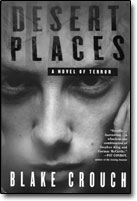| Desert Places probes
dark spaces
by Amy Maestas
 Desert
Places: A Novel of Terrob Desert
Places: A Novel of Terrob
By Black Crouch
Thomas Dunne Books
280 pages
When crime writer Andrew Thomas receives a letter in his
mailbox telling him there’s a dead body buried in
his back yard – and the body has his blood on it
– readers can expect a stirring tale. Initially,
Thomas brushes off the stunning declaration as a joke
from a whacked-out fan. But that nagging “what-if”
feeling that people often experience gets the better of
him. Most people would call the cops if something like
this happened. Yet, since Thomas is accustomed to freaky
plotlines, he bypasses alerting the authorities and digs
in the dirt.
To his surprise and dismay, he finds the body. It isn’t
just any body. It’s Rita Jones, a dead school teacher
whose disappearance was highly publicized in Thomas’
town. Thus begins a fast-paced thriller in Durango writer
Blake Crouch’s debut novel, Desert Places. Touted
as a “novel of terror,” the story is one of
insanity, jealousy and murder that is often violent and
gory.
Thomas follows the letter’s instruction to find
the paper in the body’s pocket and call the number.
When he does, he enters a sort of twilight zone that only
he could write about. He bags his book tour for his new
crime story. He flies to
Maria’s Bookshop,
960 Main Ave., will host
a talk and book signing
with Blake Crouch on
Thursday, May 6, at 6
p.m. Crouch lives in
Durango, where he is at
work on the sequel to
Desert Places. |
Denver and is soon whisked to a remote cabin in Wyoming
(a location that is really more prairie than desert),
where he ends up a hostage to someone who feeds him salmon,
veal and lobster, lets him drink wine and listen to jazz.
He also forces him to read classic philosophical texts
like Machiavelli’s The Prince – a tome describing
the way a prince may gain and maintain his power. Machiavelli’s
ideal prince, by the way, is an amoral and calculating
power hog. The texts – all of which figure in murder
– are clues about Thomas’ subjugator. Hardly
an unbearable situation it seems.
Yet Thomas’ captor, Orson, is a diabolical sicko
whose childhood, readers learn toward the end of the book,
traumatized him so gravely that it turned him murderous.
His first killing was nothing if not nonchalant. Each
one thereafter became psychologically easier, partly because
killing sexually gratifies Orson. He videotapes the acts,
adding them to his extensive collection. Crouch never
addresses why Orson doesn’t get caught or what he
does with the bodies. Readers only learn that he cuts
out their hearts, which he eventually boxes together and
sends to the White House.
Within days of captivity, Orson forces Thomas to also
kill. He does, but only to keep from getting killed himself.
Like most horror stories, Desert Places requires readers
to willingly suspend their instincts to disbelieve. Crouch
provides enough far-out sketches about Thomas and the
trouble he’s in to compel readers to carry on with
the book. Indeed, the story is so good in the first half
of the book that even readers who aren’t drawn to
psychological cat-and-mouse-game plots won’t be
able to put it down. In the first seven pages alone, there
are enough unexplained actions by Thomas himself that
Crouch cleverly sets up sufficient suspense.
Crouch is also good at writing prose. He creates vivid
scenes and glib dialog that is neither forced nor tedious.
Crouch’s talent shines best when Thomas suffers
through his captivity. The irony that Thomas endures an
experience much like the ones he makes money writing about
it can hardly be lost on anyone. Fortunately, Crouch doesn’t
exaggerate the irony by being moralistic (though the antagonist
of his story is sometimes guilty of such). Perhaps that’s
because there’s nothing good to say about butchery.
Unfortunately, Crouch is guilty at times of too much
gratuitous grossness, if you will. Some dialogues are
useless – as if Crouch felt he needed to turn up
the ick factor in order for Desert Places to meet the
demands of its subtitle. It’s too bad.
Between that and the fact that the story seems to lose
its initial level of excitement about two-thirds of the
way through, it makes Crouch’s first attempt a wee
bit weaker than it could be. The last bit of the book
ends up too clichE9d; the explanations for characters’
actions and the childhood flashbacks seem more like filler
than necessity.
Still, readers shouldn’t shy away. Newbie writer
Crouch has something going on. His story has enough suspense,
hedonism and concupiscence to keep readers turning the
pages. Will it scare readers into keeping their lights
on at night as the book promises? No. But it will shake
your confidence in humanity.
|

